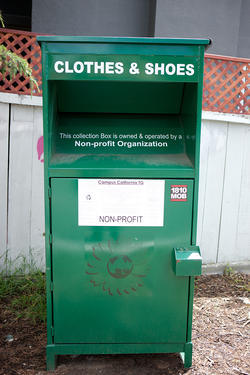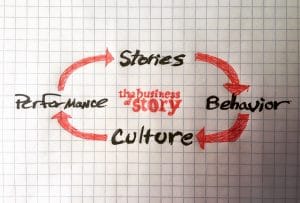 “Clunk, slam!” is the hollow thanks you get when a collection bin devours your donated items. You may think that the sack of clothes you just stuffed through the metal orifice is going to help a charity. Chances are, it won’t. More likely, your kind contribution will line the pockets of a for-profit thrift operator.
“Clunk, slam!” is the hollow thanks you get when a collection bin devours your donated items. You may think that the sack of clothes you just stuffed through the metal orifice is going to help a charity. Chances are, it won’t. More likely, your kind contribution will line the pockets of a for-profit thrift operator.
There is no real donation involved – presenting something as a gift, grant or contribution – although the for-profit entity that hoodwinks you out of your items would like you to think so.
Inside Edition just aired this story on Bruce Binler, a Long Island, NY businessman who owns hundreds of clothing bins that masquerade as non-profit collection points. It is despicable that they can intercept your donated items for their own gain that would otherwise help put people back to work, as in the case of Goodwill of Central Arizona.
Since the for-profit collection bins have appeared in Arizona, Goodwill of Central Arizona has seen its volume of donated items drop by 40 percent, from 130 pounds-per-donor to approximately 72 pounds. With foresight, Goodwill has increased its number of donors; they’re just dropping off substantially fewer items per trip.
If Goodwill had not experienced the drop in per-donor volume, they could be serving 70,000 Arizonans, instead of the admirable 35,000 they currently serve, to help find jobs. Goodwill attributes much of this loss to for-profit bins.
More than 5,000 profit-seeking bins dot the vacant corners and parking lots of the Valley of the Sun, often illegally because they appear in the dead of night without the permission of the property owner. They are here to compete with legitimate non-profit organizations for your valuable castoffs. But unless these bins have a reputable nonprofit prominently displayed on them, like Goodwill, Valley Big Brothers and Big Sisters, St. Vincent De Paul, or the Salvation Army, you can bet your donated items are headed to a bulk buyer and sold out-of-state or overseas. Very little of the money from your once beloved items will remain in the local community to help put people back to work. It goes to men like Mr. Binler.
But he’s not alone. Other organizations, like Campus California, which has come under intense scrutiny in the Bay Area, are doling out 200 “cause-oriented” collection bins throughout Arizona.
It’s no wonder that competition for your resale items has gotten nasty. According to the Association of Resale Professionals, resale is a multi-billion dollar a year industry that has grown by seven percent each of the last two years.
Profits are driving unscrupulous marketeers to invade the historical retail domain of non-profits and pirate your items with the false promise that they will have a significant impact on an important social cause.
So the next time that collection bin slams shut on your donated items, think again where it actually might be headed and who is truly benefitting.













at 12:34 pm
Nice coverage, Park
But I think the headline could have been more descriptive of the issue – “Are Fake Drop-Off Bins Diverting Your Clothing Donations From Real Charities?”
I would be fine with a for-profit retailer picking up my donated clothes, if they are transparent about it. Following the supply chain, it would be interesting to know what the percentage of reject clothes landfilled by the for-profit groups is, vs. the charities.
at 1:09 pm
Landfills aside, the for-profits employee some people and the owners make the money. The non-profits use those funds to train and support people back into the workforce, and create tens of thousands of jobs and employable folks. That’s a can’t miss in my book.
at 4:30 pm
[…] the convenience of throwing them away or dumping them in curbside donations bins – many owned by questionable for-profit entities that take your items out of […]
at 6:53 am
[…] source: Park Howell Where to put your ditched […]